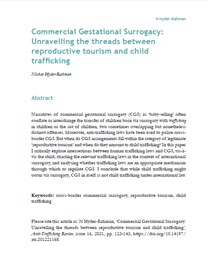Narratives of commercial gestational surrogacy (CGS) as ‘baby-selling’ often conflate or interchange the transfer of children born via surrogacy with trafficking in children or the sale of children, two sometimes overlapping but nonetheless distinct offenses. Moreover, anti-trafficking laws have been used to police cross border CGS. But when do CGS arrangements fall within the category of legitimate ‘reproductive tourism’ and when do they amount to child trafficking? In this paper I critically explore intersections between human trafficking laws and CGS, vis-à-vis the child, charting the relevant trafficking laws in the context of international surrogacy, and analysing whether trafficking laws are an appropriate mechanism through which to regulate CGS. I conclude that while child trafficking might occur via surrogacy, CGS in itself is not child trafficking under international law.

